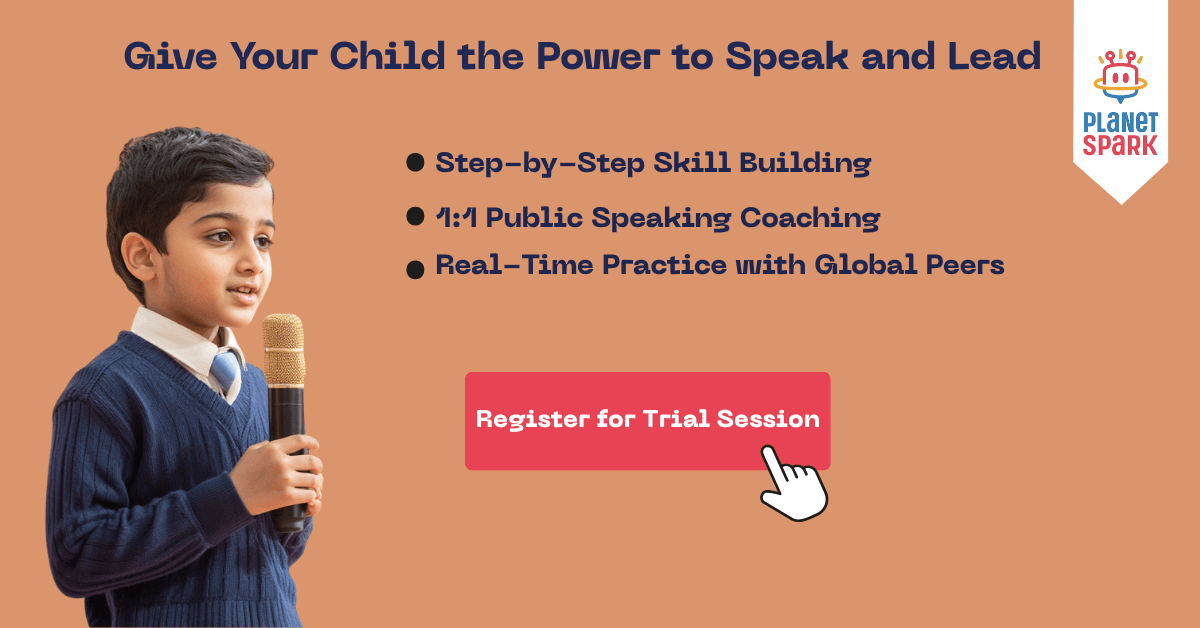Tips for Kids to Master the Art of Public Speaking
Last Updated At: 23 Jul 2025
8 min read

Table of Contents
- Public Speaking Tips for Kids That Actually Work
- The Art of Public Speaking for Children: How to Build It
- Why Public Speaking Matters More Than Ever
- Fun Activities to Build Public Speaking Skills at Home
- Handling Stage Fright: What to Teach Your Child
- How PlanetSpark Builds Public Speaking Confidence
- Conclusion
- FAQs on The Art Public Speaking for Kids
Does your child clam up during school assemblies? Do they dodge elocution contests or struggle to speak up during class discussions? You’re not alone. Many parents notice their child hesitating to speak publicly, even though they communicate comfortably at home. The solution? Introduce them early to the art of public speaking.
At PlanetSpark, we empower children aged 4 to 14 to speak confidently, think creatively, and communicate effectively. With personalised coaching and engaging activities, we help transform timid speakers into persuasive presenters.
Public Speaking Tips for Kids That Actually Work
Here are five more detailed tips to help children improve their public speaking with ease:
- Keep it Simple and Clear
Children should avoid trying to sound too complex. Clear, simple language helps them feel more comfortable and makes it easier for their audience to understand. For example, instead of saying “I am here to elucidate,” they can say “I want to explain.”
- Practice with a Pet or Toy
For kids who are shy, having an audience, even if it's a stuffed animal, can help them get used to the idea of speaking aloud. Ask them to present their speech to their teddy bear. This fun twist reduces pressure.
- Start with a Strong Opening Line
Teach them to grab attention early. A fun fact, a question, or even a personal story helps hook the audience. For instance, “Do you know who invented chocolate?” can lead into an engaging speech about food.
- Use Notes, Not Scripts
Instead of memorising every word, children should write down key points. This encourages natural speaking and helps them stay flexible if they forget something.
- Celebrate the Small Wins
Did they speak in front of the family? That counts. Presented something in class? Celebrate it. Every attempt is a step toward confidence.

See the Difference in One Session. Book a Free Demo Now!
Discover how personalised coaching transforms public speaking skills.
The Art of Public Speaking for Children: How to Build It
Public speaking is more than just talking into a mic. It’s the skill of expressing ideas clearly, engaging an audience, and speaking with purpose. And it can be cultivated, step by step. Here are six ways to help your child begin mastering this essential life skill.
1. Begin with Stories, Not Speeches
Every child loves a good story. Instead of asking them to "give a speech," invite them to tell a short story about their day or an adventure from their imagination. Storytelling naturally builds structure, pacing, and emotion, key elements of effective public speaking.
2. Use Play-Based Speaking Activities
Make public speaking fun. Turn it into a game:
- Impromptu speech challenge: Pick a topic and speak for one minute.
- Role play: Pretend to be a news anchor, a chef, or a zookeeper.
- Debate duels: Pick silly topics like "Is pizza better than burgers?"
These games reduce fear and build spontaneity.
3. Create a Daily Speaking Habit
Confidence grows with repetition. Encourage your child to talk about a topic for one minute each day. It could be during breakfast or at bedtime. Regular practice, even without an audience, helps them get comfortable with expressing their thoughts aloud.
4. Focus on Delivery, Not Just Words
Help your child understand the power of voice and body:
- Eye contact shows confidence
- Pauses give weight to ideas
- Hand gestures add clarity
- Smiling makes them relatable
You can even record and play back short speeches to help them see and hear their progress.
5. Offer Constructive Praise
Instead of correcting every mistake, highlight what they did well:
- “You had great eye contact!”
- “I liked your confident tone.”
- “That opening line grabbed my attention!”
This builds their belief in their own voice.
6. Let Them Watch Great Speakers
Children absorb by observing. Watch age-appropriate speeches, TED-Ed videos, or even inspiring moments from animated films. Ask: "What did you like about how they spoke?" This builds a sense of what powerful speaking looks and feels like.
Why Public Speaking Matters More Than Ever
In today’s world, being able to express ideas clearly is as important as academics. Kids who speak confidently:
- Stand out in school presentations
- Participate actively in class discussions
- Perform better in interviews and competitions
- Handle social situations with more ease
- Grow into future leaders
Example: A child who once avoided stage events begins hosting school functions, leading projects, or even starting their own podcast!
Common Mistakes Parents Make
- Pushing too hard, too fast: Let your child build confidence gradually. Don’t expect perfection on Day 1.
- Criticising in front of others: Keep feedback private and encouraging.
- Comparing to others: Every child has their own journey. Applaud effort, not comparison.
Your Child’s First Step to the Spotlight
Book a free session and see them speak with clarity and courage.
Fun Activities to Build Public Speaking Skills at Home
| Activity | What It Builds | How to Do It |
|---|---|---|
| Mirror Speeches | Confidence and posture | Ask them to deliver a 30-second talk to the mirror |
| Family Talent Show | Stage exposure | Let everyone in the family present something fun |
| Word of the Day Talk | Vocabulary and spontaneity | Pick a new word and use it in a short speech |
| Voice Recording Games | Tone and clarity | Record a speech, then play it back together |
| Character Talks | Creativity and emotion | Speak as a favourite cartoon or superhero |
Handling Stage Fright: What to Teach Your Child
Even confident kids can feel nervous on stage. Help them manage fear with these techniques:
- Deep breathing before speaking
- Visualising a friendly audience
- Smiling to release tension
- Practising their opening line until it feels natural
Remind them: butterflies are normal. Even professional speakers feel them. Courage is about doing it anyway.

How PlanetSpark Builds Public Speaking Confidence
PlanetSpark helps children become confident speakers through personalised guidance, smart technology, and engaging practice.
One-to-One Expert Trainers: Every child is paired with a certified trainer who offers individual attention, live feedback, and support in storytelling, grammar, fluency, and expression.
Customised Learning Paths: Based on an initial assessment, each child receives a personalised roadmap that targets grammar, vocabulary, structure, and confidence. This path is updated regularly as they grow.
Smart AI Feedback: With SparkX, kids upload speech videos that are analysed for clarity, posture, grammar, and confidence. Parents receive detailed reports showing strengths and improvement areas.
Interactive AI Practice: Children can practise anytime with our AI coach, receiving instant tips on pacing, grammar, and delivery in a supportive, independent setting.
The Spark Diary: This digital journal helps children build strong writing habits. They write reflections, speeches, and stories that enhance creativity and clarity.
Gamified Learning Tools: Daily quizzes and challenges make English fun. From vocabulary games to grammar battles, kids enjoy consistent and playful learning.
Showcases and Competitions: Regular events like open mics, speech contests, and creative writing competitions give kids opportunities to shine and build public confidence.
PlanetSpark combines expert coaching, AI tools, and interactive experiences to nurture confident, articulate young speakers.
Conclusion
The art of public speaking isn’t about being loud or perfect, it’s about being real, clear, and connected. With gentle guidance, regular practice, and positive reinforcement, your child can grow into a speaker who owns the room. And the earlier they start, the easier it becomes.
FAQs on The Art Public Speaking for Kids
1. At what age should kids start learning public speaking?
Children as young as 5 or 6 can begin with simple speaking activities. The earlier they start, the easier it becomes to build confidence and clarity.
2. Why is public speaking important for kids?
It helps children express themselves clearly, boosts self-confidence, improves academic performance, and prepares them for leadership roles in the future.
3. My child is very shy. Can they still become a good speaker?
Absolutely. With the right guidance, regular practice, and positive reinforcement, even the shyest kids can become confident communicators.
4. How can I help my child practise public speaking at home?
Encourage them to speak in front of family, record themselves, narrate stories, or teach you something they learned at school. Make it fun and pressure-free.
5. What should a beginner focus on while speaking?
Begin with clear, simple language. Focus on good posture, eye contact, and breathing. Over time, add voice modulation and gestures.
6. How does PlanetSpark help improve public speaking?
PlanetSpark offers one-on-one sessions with expert trainers, AI-driven feedback, customised roadmaps, and engaging activities that make learning fun and effective.
7. How long does it take for kids to become confident public speakers?
It varies for each child. With consistent practice and the right mentorship, many kids show noticeable improvement within a few weeks to a few months.
8. What are common mistakes kids make while speaking in public?
Speaking too fast, avoiding eye contact, relying too much on memorisation, and using complex words instead of simple, clear language.
Personalized Communication Report
Record a video to get a AI generated personalized communication report for your child
Select Learner's Class

Hi There, want to try these
tips for your child with
LIVE with our expert coach?
Let's check your child's
English fluency
